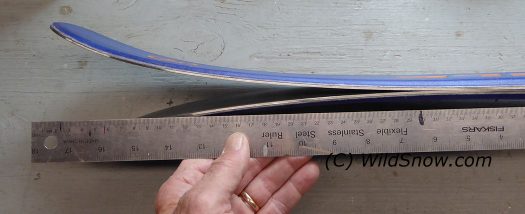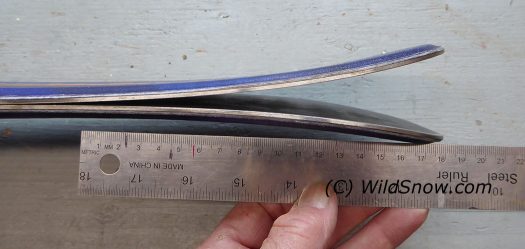Lack of ski weight is important to us. Especially now that the industry has indeed figured out how to make astoundingly light skis that still crank out turns. Nonetheless, exceptions are allowed. To that end, what I’m always looking for are skis marketed as backcountry and performing well in a variety of conditions — all at an excellent price. In other words, your “entry level” plank for ski touring, or perhaps something you’d feel comfortable with as a quiver of one, at the resort or in the backcountry. Being made in the USA is a plus as well.
Thus, we constantly circle back to Voile. Nearly every ski they make is a hit. Take their Vector model for example. It’s been around a few years now. When it went to market in 2010, official word was “A light touring ski capable of carving a beautiful turn.” Our reviews agreed. Along with that, Voile was selling a ski called the SuperCharger. With a ~105 mm waist and some mass, SuperCharger wasn’t our favorite touring ski — but it was an excellent ride.
Thus, enter the Ultra Vector, combining the SuperCharger and Vector. Supple flex, dimensions around 95 at the waist, wonderful pricepoint of $695. Made in USA.
Will be available in 154,164,171,177,184 centimeter lengths that vary a bit in width dimensions, examples:
171 cm length is 127/94/111 radius 18.5
177 cm length 130/96/114 radius 19.5
Our pre-retail testers are heavier than what’ll be offered in retail so I won’t publish a scale weight. Voile says they’ll come in at close to 1587 grams per ski in a 177. That’s ok, though we’d contend that a true “touring” ski these days, in this width and length, would be noticeably lighter.
Main thing, I mounted the Ultra Vector with a set of freeride touring bindings and got out for a couple of sessions. They’re indeed a truly all-around ski, with good edgehold on piste, supple and somewhat playful in powder. They felt more aggressive than what I normally ski on, pretty much what I’d call a resort ski that tours. Probably due to the beefy wood core, chatter was not in the Ultra Vector vocabulary. In fact, I easily exceeded the speed limit of my ski touring boots without any complaint from the skis. On the other hand, I wouldn’t call these planks particularly demanding, they’d be fine for a person still working on improving their downhill ski skills.
There you go, just thought I’d get this out there for this coming autumn shopping season.
WildSnow.com publisher emeritus and founder Lou (Louis Dawson) has a 50+ years career in climbing, backcountry skiing and ski mountaineering. He was the first person in history to ski down all 54 Colorado 14,000-foot peaks, has authored numerous books about about backcountry skiing, and has skied from the summit of Denali in Alaska, North America’s highest mountain.



